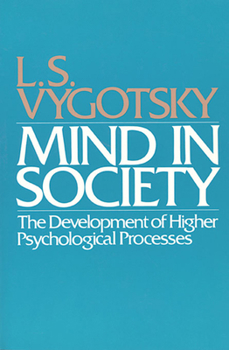Mind in Society: Development of Higher Psychological Processes
Select Format
Select Condition 
Book Overview
Vygotsky's sociocultural theory of cognitive development in his own words--collected and translated by an outstanding group of scholars.
"A landmark book." --Contemporary Psychology The great Russian psychologist L. S. Vygotsky has long been recognized as a pioneer in developmental psychology. But his theory of development has never been well understood in the West. Mind in Society corrects much of this misunderstanding. Carefully edited by a group of outstanding Vygotsky scholars, the book presents a unique selection of Vygotsky's important essays, most of which have previously been unavailable in English. The mind, Vygotsky argues, cannot be understood in isolation from the surrounding society. Humans are the only animals who use tools to alter their own inner world as well as the world around them. Vygotsky characterizes the uniquely human aspects of behavior and offers hypotheses about the way these traits have been formed in the course of human history and the way they develop over an individual's lifetime. From the handkerchief knotted as a simple mnemonic device to the complexities of symbolic language, society provides the individual with technology that can be used to shape the private processes of the mind. In Mind in Society Vygotsky applies this theoretical framework to the development of perception, attention, memory, language, and play, and he examines its implications for education. The result is a remarkably interesting book that makes clear Vygotsky's continuing influence in the areas of child development, cognitive psychology, education, and modern psychological thought. Chapters include:1. Tool and Symbol in Child Development
2. The Development of Perception and Attention
3. Mastery of Memory and Thinking
4. Internalization of Higher Psychological Functions
5. Problems of Method
6. Interaction between Learning and Development
7. The Role of Play in Development
8. The Prehistory of Written Language
Format:Paperback
Language:English
ISBN:0674576292
ISBN13:9780674576292
Release Date:March 1978
Publisher:Harvard University Press
Length:176 Pages
Weight:0.60 lbs.
Dimensions:0.5" x 6.0" x 9.3"
Customer Reviews
3 ratings
Vygotsky, Mind in Society
Published by Thriftbooks.com User , 19 years ago
This is a good start to understanding the researh and theories of Lev Vygotsky.
A MUST READ for parents, preschool through elem educators.
Published by Thriftbooks.com User , 22 years ago
While the book is full of theory that might discourage someone from reading it, it has an absolutly fantastic practical implacation worth the effort! The second half of this book, "Educational Implications" discusses the Zone of Proximal Development. Learning about this "Zone" plus the discussion regarding how children learn to read and write, tells those of us who really want to help children learn, ways to set-up an environment and activities to do it!!Don't let the theory scare you away, this is a MUST READ!
Socio-historical psychology
Published by Thriftbooks.com User , 25 years ago
This is one of the earliest and still one of the best introductions to socio-historical psychology, the study of how individual human intelligence develops in interaction with people and the environment. In concert with many contemporary approaches in cognitive science today, Lev Vygotsky, A.R. Luria and A.N. Leontiev argued that human intelligence is characteristically mediated through objects and social activity. Humans think through tools. Talking to oneself, for example, is not an irrelevant activity. Putting one's actions into speech is a way of focusing one's consciousness on the problem. This kind of speech is not pointless, but rather a cognitive tool that gives one a greater awareness of one's own actions and makes it easier to modify these actions--a point that Vygotsky proved with research on how children solved problems. Much of human activity involves making use of tools, signs, and activities, the kinetic melodies of action and conceptualization that make us smart, and through which we are able to accomplish the uniquely human feats of complex intellectual action. This is an excellent place to begin studying Vygotsky and activity theory. If you like this you will also like A.R. Luria's *The Making of Mind*, and the classics *The Man With A Shattered World* and *The Mind of a Mnemonist*, the books that inspired Oliver Sacks' writing.






